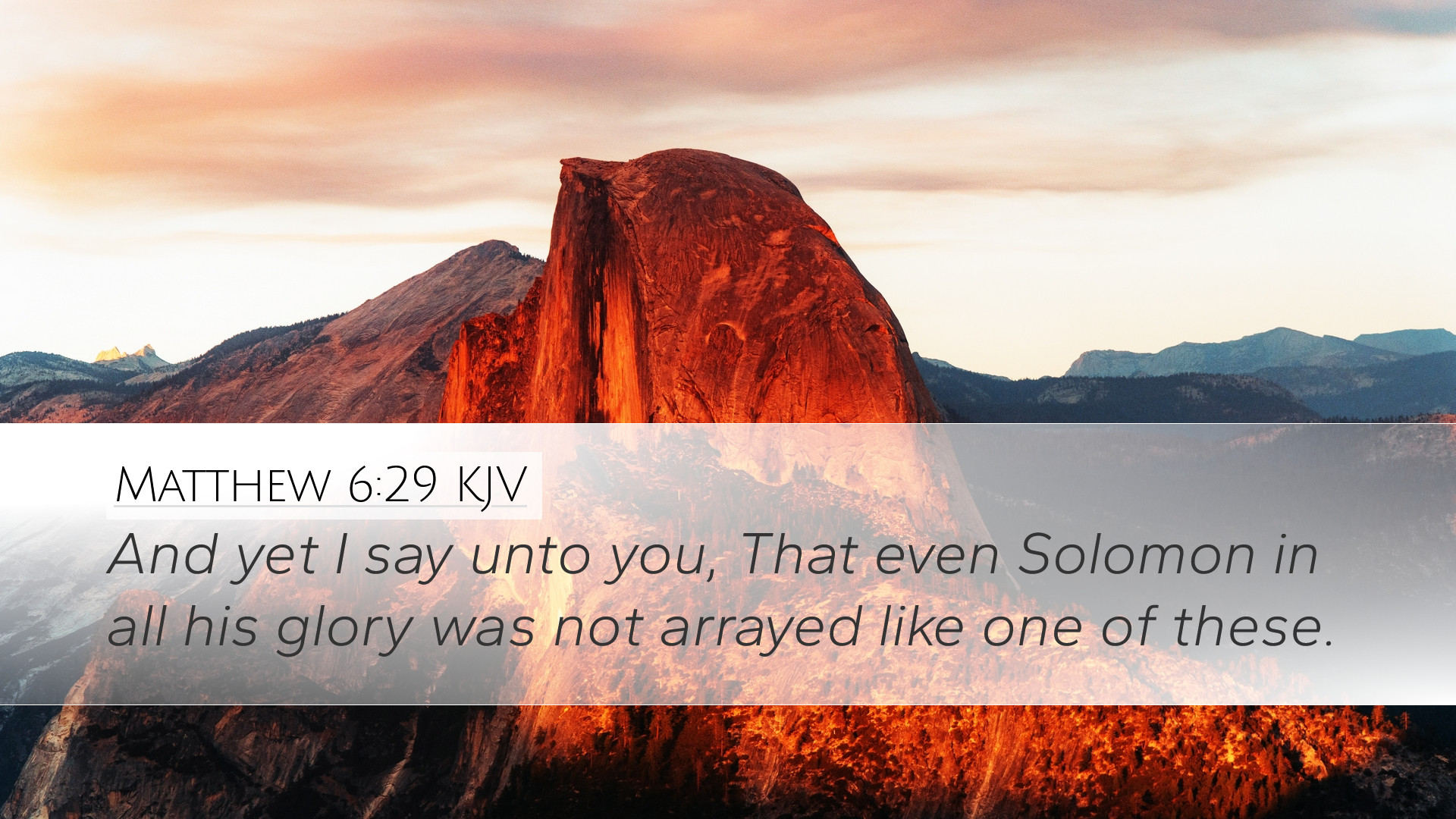Commentary on Matthew 6:29
Verse Reference: Matthew 6:29 - "And yet I say unto you, That even Solomon in all his glory was not arrayed like one of these."
Introduction
The teachings of Jesus in the Sermon on the Mount serve as a profound declaration of the principles of the kingdom of God. Here, in Matthew 6:29, Jesus contrasts the splendid adornments of King Solomon with the simple yet majestic beauty of the lilies of the field, highlighting God's provision and the futility of earthly anxieties regarding material needs. This verse invites deep reflection on the nature of divine majesty and the inherent value of God's creation.
Insights from Public Domain Commentaries
Matthew Henry's Commentary
Henry asserts that the reference to Solomon emphasizes the surpassing beauty found in nature, suggesting that even the richest and most powerful are outdone by the simplest elements of creation. He elaborates that Solomon’s glory was a dazzling display of human achievement, yet it pales in comparison to the flowers crafted by God. This comparison serves to reassure believers of God's care in providing for their needs.
Albert Barnes' Notes on the Bible
Barnes elaborates on the significance behind Solomon's splendor as a king known for his wealth and wisdom. He notes that garments worn and the luxury of Solomon symbolize transient human grandeur. The comparison to the lilies implies that the flowers, though humble, are a testament to divine artistry. Barnes emphasizes the message that God values creation and thus will provide for humanity's needs, encouraging believers to trust in God rather than be consumed by worry.
Adam Clarke's Commentary
Clarke reveals that Jesus’ reference to Solomon is intentional, meant to illustrate the stark contrast between man-made splendor and divine creation. He points out that the glory of Solomon was external and artificial, while the lily’s beauty is natural and genuinely created by God. Clarke encourages readers to appreciate the simplicity and elegance of God's creations, observing that if God cares for flowers, which are temporary, He will certainly care for humankind, who are made in His own image.
Theological Reflections
This verse is deeply rooted in the themes of divine providence and the inherent worth of creation, resonating with the fundamental Christian belief in God’s sustaining grace. The focus on the lilies serves as a metaphor for the transient nature of life and material possessions. The beauty of the lilies illustrates God's attention to detail and care over creation, calling believers to reflect on their identity as God's beloved children.
Furthermore, the juxtaposition of human efforts with divine craftsmanship invites a critical evaluation of worldly pursuits versus spiritual priorities. It challenges believers to reconsider their values—encouraging a move away from anxiety and towards trust in God's provisions.
Practical Applications
- Trust in Divine Provision: Like the lilies of the field, we are reminded of God's faithfulness to provide for our needs. Pastors should emphasize this truth in their teachings to encourage congregants facing anxiety about their futures.
- Embrace Simplicity: The beauty of the lilies invites a lifestyle of simplicity and contentment. Students and theologians are encouraged to explore the theological implications of simplicity and its relevance in today's consumer-driven society.
- Nature as a Reflection of God's Glory: Scholars are invited to study the relationship between creation and Creator, contemplating how nature’s beauty points believers back to the majesty of God.
- Value in the Ordinary: The ordinary items around us, such as flowers, can serve as reminders of God's presence and care. This perspective can reshape how Christians view everyday life.
Conclusion
In summary, Matthew 6:29 captures the essence of God’s care for creation and challenges our understanding of true wealth and beauty. The insights from Matthew Henry, Albert Barnes, and Adam Clarke provide profound depth to this verse, enriching its understanding for scholars, students, and pastors alike. As believers reflect on this passage, they are called to place their trust in a God who surpasses even the greatest human accomplishments, finding peace in His provision and beauty in His creation.


